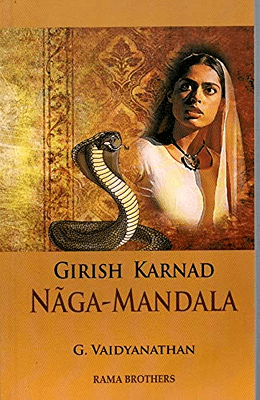Naga mandala by Girish Karnad SummaryGirish Karnad wrote the drama titled Nagamandal, which was first released in 1990. The principal figures of the queen are the subject of the play's plot. He was wed to a woman by the name of Alpna. In order to keep the queen in the room, Alpana always kept a concubine outside for the majority of the day. At the time of the analogy, he only returns home once every day. Even though Appan doesn't care for his wife, he doesn't waste any time speaking to her. Vishala always silences Rani when she tries to speak to Alpana by claiming that her arguments are unconvincing. 
Girish Karnad wrote the drama titled Nagamandal, which was first released in 1990. The principal figures of the queen are the subject of the play's plot. He was wed to a woman by the name of Alpna. In order to keep the queen in the room, Alpana always kept a concubine outside for the majority of the day. At the time of the analogy, he only returns home once every day. Even though Appan doesn't care for his wife, he doesn't waste any time speaking to her. Vishala always silences Rani when she tries to speak to Alpana by claiming that her arguments are unconvincing. SummaryAn elderly blind woman named Kurudhava and her son Kappana one day approach Appan's home. She converses with Rani while at home by herself. Kurudhwa compliments her on her beauty and informs her of Appanna's romantic relationships. By offering Rani romantic roots, Kurudhwa decides to assist Rani in winning her husband's affection. Hearing Kurudhwa's strategy, the queen was pleased. They were given two cultural origins by Kurudhwa. The queen handed Appan the tiny root after mixing it with milk. All of this, however, was in vain. This is unsuccessful. He then considered giving it a large root. She arrives to an ant hill outside the house where a king cobra dwells because she was terrified to give him red paint. The queen was pleased because she believed that her husband's perspective had changed and that he now treated her with respect rather than reprimanding her. However, her husband Appanna treats her like a servant during the day. As a result, Appanna's behavior varies between day and night since during the day, the actual Appanna returns home while at night, he was Naga in the form of Appanna. Rani therefore believes that she dreamed that Appan would come to meet her at night. But after a few months, Rani learns that she is pregnant, and she then understands that Appanna didn't simply visit her at night in her dream, but in reality. After she revealed his existence to her husband, who was terrified of his queen, he carried her to the "panchayat." It is assumed that he did not continue to have an unlawful relationship with Rani because he accused her of having an adulterous affair with another man. Rani, however, asserts that Appan is the child's father. The panchayat elders of the hamlet then suggest that the queen be made to endure a trial to establish her innocence. Rani walks to Bambi, holds Naga in her hand, and claims that Naga had counseled her in order to prove her innocence. It around his neck like a garland. It didn't bite him after that; it simply slid off his shoulder. His innocence was thus established. Sach later views Rani as a goddess and agrees to adopt both of them. Appan was aware that he was not the child's father, yet he was forced to accept him despite his confusion. A few days later, Naga had the thought that he should see Rani, so he went home and discovered her there with Apanna. When the Naga saw this, he became furious and decided to kill the queen, but he was stopped by love, and hid in his long hair while assuming the shape of a little snake. The dead naga appears and seems to be alive when the queen brushes her hair in the morning. However, the audience member (the man) was not from the unhappy ending, so he offers a cheerful conclusion, which is... The live naga collapses as Rani works her hair; Appana tries to murder him, but Rani succeeds in hiding it back in his hair. Theme of the storyA philosophical theater production called "Naagmandal" explores topics including feelings, defiance of social norms, love, and the quest for individual independence. The position of the Queen, the play's principal character, is connected to the major ideas in this passage. Here, the emphasis is on issues like the struggle between society's drive for independence and tradition, the tension between love and social expectations, and the pursuit of one's own identity.
Next TopicOn Killing a Tree Summary
|
 For Videos Join Our Youtube Channel: Join Now
For Videos Join Our Youtube Channel: Join Now
Feedback
- Send your Feedback to [email protected]
Help Others, Please Share









